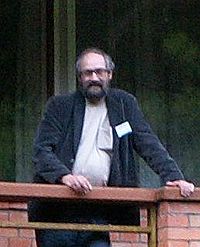Sergei Starostin
Sergei Anatolyevich Starostin | |
|---|---|
 Dr. Starostin on June 2, 2000 | |
| Born | March 24, 1953 |
| Died | September 30, 2005 (aged 52) Moscow, Russia |
| School | Moscow school, historical linguistics |
Main interests | long-range language reconstruction (especially Nostratic and Dené–Caucasian), glottochronology, accentology (especially Indo-European) |
Notable ideas | Dené–Caucasian hypothesis, reconstruction of Proto-Altaic, Proto-North-Caucasian, Proto-Yeniseian, Proto-Tibeto-Burman, Proto-Kiranti, reconstruction of Old Chinese and Proto-Japanese, advancement of "recalibrated glottochronology" |
Influenced
| |
Sergei Anatolyevich Starostin (Cyrillic: Серге́й Анато́льевич Ста́ростин, March 24, 1953 – September 30, 2005[1]) was a Russian historical linguist and philologist, perhaps best known for his reconstructions of hypothetical proto-languages, including his work on the controversial Altaic theory, the formulation of the Dené–Caucasian hypothesis, and the proposal of a Borean language of still earlier date. He was also the author of a widely respected reconstruction of Old Chinese.
Contents
Theories[edit]
In 1986, Starostin and Igor M. Diakonoff suggested that the Hurro-Urartian languages belong to the Northeast Caucasian language family. Starostin was also instrumental in the reconstruction of Proto-Kiranti, Proto-Tibeto-Burman, Proto-Yeniseian, Proto-North-Caucasian, and Proto-Altaic. He developed the theory, originated by Abu al-Ghazi Bahadur Khan in the 17th century, but really revived by Gustaf John Ramstedt in the early 20th century, that Japanese is an Altaic language.[citation needed]
The Dené–Caucasian hypothesis proposes that Northwest Caucasian, Northeast Caucasian, Yeniseian, Sino-Tibetan, and Na-Dené form a single, higher-order language family. According to Starostin, the Dené–Caucasian and Austric macrofamilies, together with the Nostratic macrofamily (as envisaged by Vladislav Illich-Svitych, with some modifications), can further be linked at an earlier stage, which Starostin called the Borean (i.e. 'Northern') languages.
Evolution of Human Languages project[edit]
Since 1985, Starostin had been developing STARLING[2] a linguist's workplace software. He was assisted in his work[3] by Murray Gell-Mann, a Nobel Prize-winning physicist.[4] At the time of his death, he was a professor at the Russian State University for the Humanities, a visiting professor at the Santa Fe Institute, and a frequent guest lecturer at Leiden University in the Netherlands, where he was awarded the degree of Doctor honoris causa in June 2005.
Starostin died of a heart attack on September 30, 2005 in Moscow. His son, Georgiy Starostin, is also a linguist.
Selected works by Sergei A. Starostin[edit]
- 1986. Co-authored with Igor M. Diakonoff. Hurro-Urartian as an Eastern Caucasian Language. Munich: R. Kitzinger.
- 1991. Altajskaja problema i proisxoždenie japonskogo jazyka, 'The Altaic Problem and the Origin of the Japanese Language'. Moscow: Nauka.
- 1995. "The historical position of Bai".[5] Moskovskij Lingvisticheskij Zhurnal 1, 174-190. Moscow.
- 2003. Co-authored with Anna V. Dybo and Oleg A. Mudrak. An Etymological Dictionary of the Altaic Languages, 3 volumes. Leiden: Brill. ISBN 9004131531.
- 2005. Co-authored with Svetlana Burlak "Comparative linguistics". ISBN 5-7695-1445-0.
See also[edit]
Notes[edit]
- ^ "The Tower of Babel". Starling.rinet.ru. 2005-09-30. Retrieved 2012-08-07.
- ^ "The Tower of Babel". Starling.rinet.ru. Retrieved 2012-08-07.
- ^ ""Sergei Starostin and I established the Evolution of Human Languages project" - Поиск в Google". Google.com. Retrieved 2012-08-07.
- ^ "Evolution of Human Languages". Ehl.santafe.edu. Retrieved 2012-11-27.
- ^ "The Historical Position of Bai" (PDF). Starling.rinet.ru. Archived from the original (PDF) on 2012-10-12. Retrieved 2012-11-27.
References[edit]
- Baxter, William H. (2006), "Eulogy: Sergej Anatol′evič Starostin" (PDF), Journal of Chinese Linguistics, 34 (1): 164–166, JSTOR 23754153
- Bengtson, John D.; Blažek, Václav (Fall–Winter 2005), "Obituary: Sergei Anatolyevich Starostin" (PDF), The Journal of Indo-European Studies, 33 (3/4): 307–314
- Woodward, Richard B. (2006), "The Man Who Loved Languages", American Scholar, 75 (4): 44–57, JSTOR 41222651
External links[edit]
- The Tower of Babel "a massive resource, containing huge amounts of information on almost all of Eurasia's language families"
- Linguists from the Soviet Union
- 20th-century linguists
- Linguists from Russia
- Historical linguists
- Corresponding Members of the Russian Academy of Sciences
- 1953 births
- 2005 deaths
- People from Moscow
- People from Santa Fe, New Mexico
- Moscow State University alumni
- Paleolinguists
- Linguists of Borean languages
- Linguists of Dené–Caucasian languages
- Linguists of Na-Dene languages
- Linguists of Caucasian languages
- Linguists of North Caucasian languages
- Santa Fe Institute people
- Linguists of Altaic languages
- Linguists of Sino-Tibetan languages
- Linguists of Hurro-Urartian languages
- Etruscan scholars